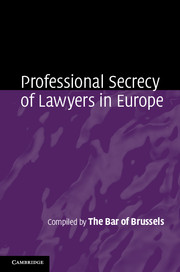Book contents
- Frontmatter
- Contents
- Contributors
- Preface
- 1 Professional secrecy in Europe
- 2 The CCBE rules on professional secrecy
- 3 Austria
- 4 Belgium
- 5 Bulgaria
- 6 Cyprus
- 7 Czech Republic
- 8 Denmark
- 9 Estonia
- 10 Finland
- 11 France
- 12 Germany
- 13 Greece
- 14 Hungary
- 15 Iceland
- 16 Ireland
- 17 Italy
- 18 Latvia
- 19 Liechtenstein
- 20 Lithuania
- 21 Luxembourg
- 22 Malta
- 23 The Netherlands
- 24 Norway
- 25 Poland
- 26 Portugal
- 27 Romania
- 28 Slovakia
- 29 Slovenia
- 30 Spain
- 31 Sweden
- 32 Switzerland
- 33 United Kingdom
- Index
Preface
Published online by Cambridge University Press: 05 June 2013
- Frontmatter
- Contents
- Contributors
- Preface
- 1 Professional secrecy in Europe
- 2 The CCBE rules on professional secrecy
- 3 Austria
- 4 Belgium
- 5 Bulgaria
- 6 Cyprus
- 7 Czech Republic
- 8 Denmark
- 9 Estonia
- 10 Finland
- 11 France
- 12 Germany
- 13 Greece
- 14 Hungary
- 15 Iceland
- 16 Ireland
- 17 Italy
- 18 Latvia
- 19 Liechtenstein
- 20 Lithuania
- 21 Luxembourg
- 22 Malta
- 23 The Netherlands
- 24 Norway
- 25 Poland
- 26 Portugal
- 27 Romania
- 28 Slovakia
- 29 Slovenia
- 30 Spain
- 31 Sweden
- 32 Switzerland
- 33 United Kingdom
- Index
Summary
Every lawyer is bound by a duty of professional secrecy. However, professional secrecy is not only a duty but also a right, to ensure that everyone receives the best legal advice and, consequently, the best defence, be it before or outside a court of law. In order to ensure the best advice or defence, however, the client must be able to speak freely to his or her lawyer, which will only be possible if the lawyer can, under no circumstances, disclose the information received from the client to the authorities or to other parties to the proceedings. If the lawyer can be forced to do so, the information could be used against the client. This fear often makes people reluctant to seek legal advice, and we all know that the worst defence is one mounted without the advice and assistance of a lawyer.
The duty of professional secrecy ensures the confidentiality of discussions between a lawyer and his or her client so that no third party can gain access to the information exchanged. Lawyers are not entitled to disclose information provided by their clients and should never be forced to do so. The information exchanged is privileged. In general, the authorities and the courts should not be able to access information protected by the attorney–client privilege and should refuse to take privileged information into account if it is disclosed in violation of the professional secrecy rules. This is essential to ensure that everyone enjoys the same rights, is bound by the same obligations and is able to defend himself or herself adequately.
- Type
- Chapter
- Information
- Professional Secrecy of Lawyers in Europe , pp. xii - xivPublisher: Cambridge University PressPrint publication year: 2013



